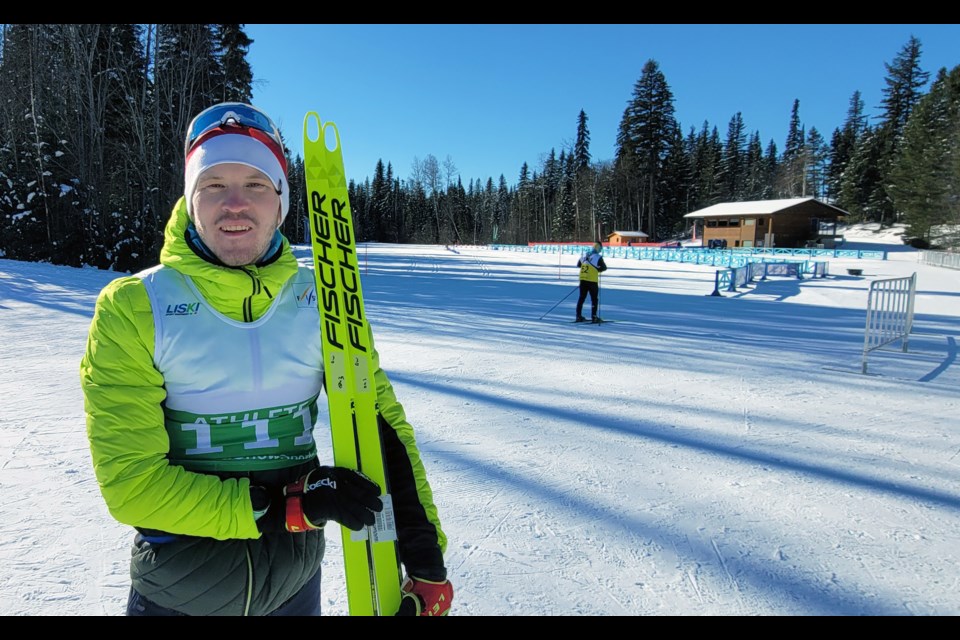Dmytro Suirko wasn’t satisfied with his shooting practice on the biathlon range at Otway Nordic Centre but his return to the Prince George after a five-year absence brought back nothing but happy memories.
The last time he skied on those trails at the 2019 World Para Nordic Championships the 27-year-old visually impaired skier from Chernihiv, Ukraine made a big splash on the medal podium.
“I take four medals, for me this is a very good place,” said Duirko, one of 23 athletes on the Ukrainian team that’s made the trip to Prince George for the 2024 Para Biathlon World Championships, which start Wednesday at the Otway trails just went of the city.
“I like the slopes and that there is much snow. Prince George was my best world championships and I like to stay here.”
He was just 2.9 seconds away from gold in the mid-distance biathlon event in 2019.
Suirko has a B2 vision impairment classification, which means his visual acuity does not exceed 1/30th after correction or his visual field does not exceed five per cent. He can see what is written on a piece of paper but has to turn his head to see those words, with his limited field of vision.
“I have very bad seeing,” he said.
When he’s on the ski trails he depends on his guide of four years, Olexander Nikonovych, to tell him where he needs to go while skiing ahead of him on the course.
On the range, he depends on an electronic system tied to the sights of his rifle. The target emits an infrared signal that is converted into sound the biathlete hears through headphones. The closer the barrel is aimed at the bullseye, the higher the frequency of the sound. When that sound becomes constant that confirms the athlete is on target.
Biathletes with a visual impairment do not shoot with bullets. Their rifles emit an invisible laser beam. They do not carry their rifles on their backs because the rifles have to remain connected using wires to the targets.
Suiarko was born with several visual impairments and grew up in a small village in northwestern Ukraine. He always wanted to ski but the school he attended has only enough skis for the older kids.
His life changed dramatically at age 16 when his parents enrolled him in a boarding school for visual impaired kids 80 kilometres away in Chernihiv, near the border with Belarus, where he attended classes in the morning and trained as skier in the afternoons.
Suiarko competed in his first Para Nordic World Cup event in 2014 and in 2017 he won the bronze medal in the Para Nordic World Championships in Germany and finished three overall in the cross-country standings.
In two World Cup stops leading up to Prince George Suiarko won three medals. He started with bronze in the biathlon sprint in late January in Toblach, Italy. Then in Martell, Italy the first week of February he won bronze in the biathlon pursuit and silver in the cross-country middle distance event.
Of the 11 countries competing in the biathlon championships Ukraine has the largest team. The next closest in size is Germany, with 10 athletes, and Canada, with five.
Taras Rad who won several sit-ski events in Prince George in 2019 is a medal contender again in the biathlon championships, which have four days of competition (Wednesday, Thursday, Saturday and Sunday).
Rad is also expected to be a frontrunner in next week’s Para Nordic World Cup Finals, also hosted by the Caledonia Nordic Ski Club at Otway.
Standing skier Grygorii Vivchynskyi will be pushing the likes of Mark Arendz of Canada and Benjamin Daviet of France to the finish line, while in the women’s standing races Ukrainians Luidmyla Liashenko and Olexandra Kononova will be looking to replicate their medal success in Italy.
“In every category they’ll be a threat,” said Team Canada coach Brian McKeever.
“There’s a good mix of young ones and veterans and that’s important. You see the veterans pulling the young ones up and the continuity there has always been impressive.”
Considering the distraction of the ongoing war in Ukraine, McKeever says its inspiring to see the Ukrainian athletes continue to push to bring pride to their country from halfway across the world.
“I know a number of them are living away from Ukraine, they’re displaced, and they’re still managing to put the efforts in and get the training done and I can’t imagine how hard that must be,” said McKeever.
“There’s more important things than sport and it’s bit of sobering though for us. Of course we’re going to be out here doing our jobs and it’s important to us but it’s also important to take step back and see the bigger picture and take stock of all that and realize how fortunate we are to be into positions we’re in."
Racing starts today at 10 a.m. with the biathlon sprint for sit-ski athletes, followed at noon by the standing races and at 1:45 p.m. by the vision impaired races. All events are free to attend.

.png;w=120;h=80;mode=crop)

